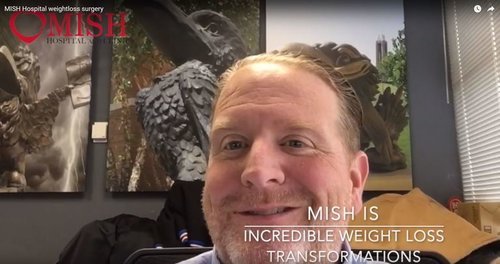Welcome to MISH Weight Loss Surgery Program
20 years experience. Accreditation is an important, life-saving process. A recent study showed that the mortality rates at non-accredited facilities are on average three times greater than the mortality rates at accredited facilities. Highly proficient surgeons that you actually meet and get to know, with over 40 years of weight loss surgery experience among them At a brand new facility catering to the bariatric patient.
Meet Our Patients





LET US HELP YOU REACH YOUR WEIGHT LOSS GOALS!
At MISH you will develop personal relationships and have continuous support from accessible providers.
We will make weight loss possible, even when it seems impossible.
Whether you are just thinking about weight loss surgery, or already had weight loss surgery make an appointment NOW to have your questions answered, discuss options or problems you may be having.
Have you previously had weight loss surgery and have not achieved your weight loss goals?
Make an appointment today to discuss weight loss surgery revision options.
Common Bariatric Surgery Questions
MISH is the only hospital in Kansas City specializing in weight loss surgery
and providing services with highly skilled surgeons who have been trained at nationally recognized hospitals including John Hopkins, Georgetown, and Baylor University, and who have over 40 years of experience with successful weight loss surgery accessible to everyone.
MISH has a nationally recognized weight loss success rate. We provide patient-centered care and education accessible from home, work, or mobile device. You will have access to educational tools and your provider to achieve success
Learn More About Weight Loss Surgery Options and Revisions
-
The Gastric Sleeve (sleeve gastrectomy) is one of the newer bariatric operations but has quickly gained popularity over the last 10 years. It is also known as the Vertical Sleeve Gastrectomy, Vertical Gastroplasty or Sleeve Gastroplasty, this procedure has become the most popular weight loss operation in the USA. It is mostly a restrictive operation – it works by controlling how much food can be eaten at one time. The operation also causes metabolic effects – which has great health benefits and improves weight loss even further. The sleeve operation is the removal of more than 85% of your stomach. The part that is removed is the most stretchable portion of the stomach. The stomach is divided and stapled vertically, creating a tube or pipe-shaped stomach pouch. The shape and length of the stomach causes serious restriction in the amount of food that can be eaten at one time. The most dramatic metabolic impact the RYGB operation has, is on diabetes. Even before any significant weight has been lost the diabetes has already improved and requires less medication to manage. Read more
-
The Roux-en-Y gastric bypass remains the gold standard to which other weight loss operations are compared. It is the oldest, and best studied weight loss operation. It is the second most frequently performed weight loss operation in the United States, after the sleeve gastrectomy. The gastric bypass takes advantage of both restriction and malabsorption to work. The restrictive part of the procedure is the creation of the small stomach pouch with a very small outlet. The stretchable part of the stomach is no longer used. The malabsorptive part of the procedure involves re-arranging of the small intestine to reduce how much of the intestine is involved in absorbing the small amount of food that is eaten. The operation also causes metabolic effects – which has great health benefits and improves weight loss even further. The most dramatic metabolic impact the RYGB operation has, is on diabetes. Even before any significant weight has been lost the diabetes has already improved and requires less medication to manage.. Read more
-
The Biliopancreatic Diversion with Duodenal Switch – abbreviated as BPD/DS – is a procedure with two parts. First, a smaller, tubular stomach pouch is created by removing a portion of the stomach, very similar to the sleeve gastrectomy. Next, a large portion of the small intestine is bypassed (75%). The duodenum, or the first portion of the small intestine, is divided just past the outlet of the stomach. A segment of the distal (last portion) small intestine is then brought up and connected to the outlet of the newly created stomach, so that when the patient eats, the food goes through the new stomach pouch and empties directly into the last segment of the small intestine. Roughly three-fourths of the small intestine is bypassed by the food stream. Read More
-
One of the most common complaints that lead to revision weight loss surgery is heartburn or reflux. Often the symptoms experienced by the patients are caused by other reasons than acid alone. The heartburn - reflux like symptoms can be caused by:
Acid reflux
Herniation of the sleeve or bypass pouch into the chest in such a manner that it is now causing a partial obstruction to the passage of food
Bile refluxing up into the stomach and esophagus
Stricture / Obstruction formation
Torsion (twisting of the sleeve)
-
Though the Lap-Band used for weight loss in individuals who have failed to lose weight through diet and exercise, many patients can experience sub-optimal weight loss despite the surgery, or develop complications. In such cases, revision weight loss surgery may be needed to induce or maintain weight loss or correct a complication.
-
The Sleeve Gastrectomy operation is used in morbidly obese patients to lose weight. Some patients can experience sub-optimal weight loss despite the surgery, or develop complications. In such cases, revision weight loss surgery may be needed to induce or maintain weight loss or correct a complication. READ MORE
-
The Gastric Bypass operation is used in morbidly obese patients to lose weight. Some patients can experience sub-optimal weight loss despite the surgery, or develop complications. In such cases, revision weight loss surgery may be needed to induce or maintain weight loss or correct a complication. Read More
-
Many people who have lost 100 pounds or more are overjoyed at their success. After losing weight, loose, heavy folds of skin can interfere with walking, balance, hygiene, skin care, and simply getting clothes to fit correctly. Plastic surgery, in most cases, is the only effective long-term solution. Removal of excess skin can improve the fit of clothes, the ability to walk and/or maintain balance, maintain hygiene, and reduce chronic skin irritation and even infections. Improving body self-image is also a great motivator for patients to maintain their efforts in weight loss. There are several things that can be offered to deal with excess skin. Dealing with excess skin after large weight loss is mostly referred to as body contouring (also known as a body lift). Several body areas can be addressed including the abdomen, thighs, buttocks, arms, and breast. Read More
Learn About Weight Loss Surgery
Weight Loss Surgery is the most effective and long-lasting treatment for severe obesity resulting in significant weight loss and the improvement, prevention or resolution of many related diseases including type 2 diabetes, heart disease, hypertension, sleep apnea and certain cancers. Studies show bariatric surgery may reduce a patient’s risk of premature death by 30-50%. Bariatric surgery is as safe or safer than some of the most commonly performed surgeries in America including gallbladder surgery, appendectomy and knee replacement
Heartburn / Reflux / Hiatal Hernia
Are you experiencing heartburn / reflux that is not responding to medical therapy?
Is your heartburn / reflux progressively getting worse?
Is your heartburn / reflux a daily problem despite medication?
Are you waking up at night choking on food or bitter tasting content?
If you answered yes to any of the questions above, continue and read more about revision weight loss surgery READ MORE
Revision Weight Loss Surgery
Are you gaining weight after bariatric surgery?
Are you having problems after weight loss surgery?
Are you experiencing reflux, heartburn that won’t go away?
Is your weight loss less than predicted?
Are you waking up at night choking on food or bitter tasting content?
If you answered yes to any of the questions above, continue and read more about revision weight loss surgery READ MORE
Learn About Obesity and Weight Loss Surgery Risks and Benefits
Studies show patients typically lose the most weight 1-2 years after bariatric surgery and see substantial weight improvements in obesity-related conditions. Patients may lose as much as 60% of excess weight six months after surgery, and 77% of excess weight as early as 12 months after surgery. On average, five years after surgery, patients maintain 50% of their excess weight loss. Majority of bariatric surgery patients with diabetes, dyslipidemia, hypertension, and obstructive sleep apnea experience remission of these obesity-related diseases
The risks of severe obesity outweigh the risks of metabolic/bariatric surgery for many patients. The risk of death associated with bariatric surgery is about 0.1% and the overall likelihood of major complications is about 4%.







